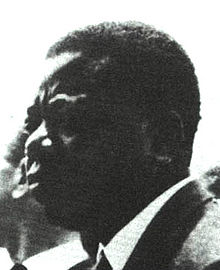Moïse Tshombe
| Moïse Tshombe | |
|---|---|
 |
|
| Prime Minister of Congo-Léopoldville | |
|
In office 10 July 1964 – 13 October 1965 |
|
| President | Joseph Kasa-Vubu |
| Preceded by | Cyrille Adoula |
| Succeeded by | Évariste Kimba |
| Personal details | |
| Born | 10 November 1919 Musumba, Belgian Congo (Now Congo-Kinshasa) |
| Died | 29 June 1969 (aged 49) Algiers, Algeria |
| Political party | CONAKAT |
Moïse Kapenda Tshombe (sometimes written Tshombé) (10 November 1919 – 29 June 1969) was a Congolese politician, in the country now known as the Democratic Republic of the Congo.
A member of the Lunda tribes, Tshombe was born near Musumba, Belgian Congo, the son of a successful businessman. He received his education from an American missionary school and later trained as an accountant. In the 1950s, he took over a chain of stores in Katanga Province and became involved in politics.
He founded the CONAKAT party, with Godefroid Munongo; it promoted a federal Congo independent from the Belgian Empire.
CONAKAT won control of the Katanga provincial legislature in the May 1960 general elections. One month later, the Congo became an independent republic. Tshombe became President of Katanga.
In the resulting strife and chaos following independence, CONAKAT declared the State of Katanga's secession from the rest of the Congo. The Christian, anti-communist pro-Western Tshombe declared, "We are seceding from chaos." Favoring continued ties with Belgium, he asked the Belgian government to send military officers to recruit and train a Katangese army.
Tshombe demanded UN recognition for independent Katanga, and he announced that any intervention by UN troops would be met with force. Nonetheless, Congolese Prime Minister Patrice Lumumba and his successor, Cyrille Adoula, successfully requested intervention from UN forces. UN forces were sent under the direction of Irish representative (to Dag Hammarskjöld), Conor Cruise O'Brien.
...
Wikipedia
